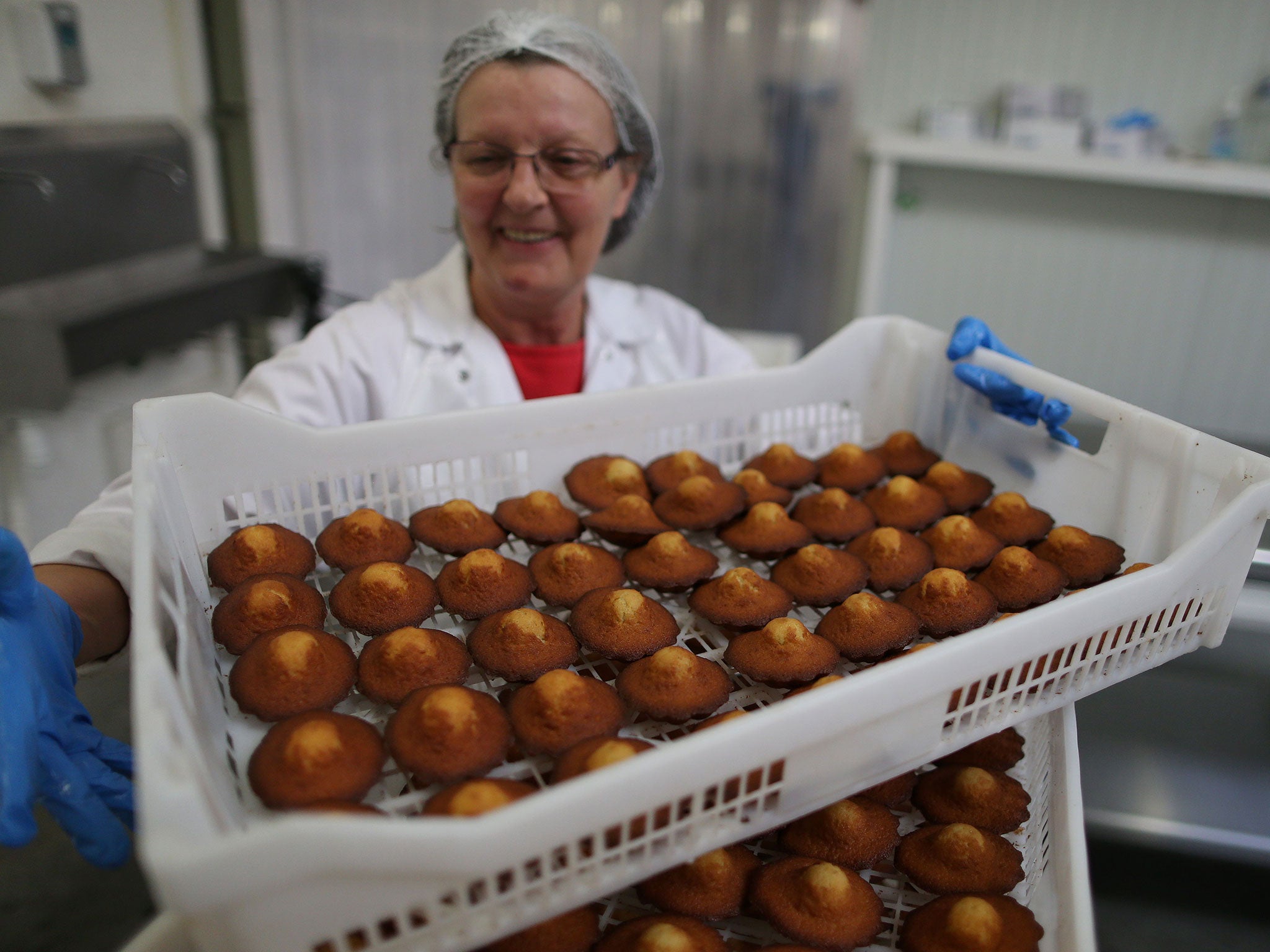How bakers occupied cake factory to save 'France's finest madeleines'
The Jeannette de Caen factory was shut after 164 years in 2014 - but staff would not go without a fight

The madeleine is a small sponge cake in the shape of a sea-shell. Along with vintage champagne and the finest raw milk cheeses, it has become an emblem of French “savoir faire” and French “joie de vivre”.
The legend of the madeleine can largely be traced to the writings of Marcel Proust (1871-1922). Even if you have never read Proust, you have probably heard of the “madeleine moment” in the first volume of “A La Recherche du Temps Perdu” (In Search of Lost Time).
Proust attributes “exquisite” powers of recall of childhood to the “sublime” taste of a madeleine dipped in tea. “And suddenly the memory revealed itself. The taste was that of the little piece of madeleine which on Sunday mornings at Combray...my aunt Léonie used to give me, dipping it first in her own cup of tea or tisane.”
Here is another story about sponge cakes and the rediscovery of lost memory - or, in this case, betrayed memory. It is a morality tale about the hypocritical practises of the contemporary French food industry but one with a happy ending.
Two years ago the celebrated Jeannette biscuit-making factory in Caen in lower Normandy closed down. Under various names since 1850 the factory had once produced some of the finest madeleines in France.
It is quite possible that the madeleine which conjured up memories of Proust’s childhood was a “Jeanette” madeleine. In the famous passage, Proust’s autobiographical hero is staying at the Grand Hotel in Cabourg, a few miles along the Norman coast from Caen. At the turn of the 20th century, the hotel bought its madeleines from the Caen factory later known as Jeannette.
By the turn of the 21st century Jeannette had become a stale crumb of its former self. It had suffered a series of buy-outs by larger companies which sought to make money by asset-stripping its reputation, lowering quality and boosting quantity – and failed. In 2013, the owner decided to close the factory and sell the brand.
The remaining female workers refused to go quietly. For more than a year, they occupied the premises and demanded government help to find a buyer.
Enter Georges Viana, 50, a Portuguese-born professional industrial trouble-shooter with no connections with Normandy or cake-making. After years of earning a good salary rescuing failed enterprises in France and abroad, he was touched by the Jeannette story. He decided to leave his job and save the factory.
“The truth is that by the time of the closure in 2013, Jeannette was producing the most disgusting rubbish and calling them madeleines,” Mr Viana told me. “They were using oil instead of butter. They were using industrial eggs so pale that you could hardly tell the yoke from the white.”
Mr Viana, with the blessing of the workers and their hard-left union, the CGT, set out to resurrect Jeanette as a producer of “top of the range” madeleines.
The government refused to help. Banks refused to lend him money. He turned to “crowd-funding”. Thanks to a media appeal, he raised €102,000 in gifts of between one euro and €1,000 each. This was more than enough to buy the brand from the bankruptcy court.
In a second “crowd-funding” appeal for equity investors, he raised another Euros 330,000 – enough to re-start the factory on a small scale on a new site in September last year.
With the help of Philippe Parc, one of France’s leading pastry chefs, Mr Viana adapted a late-19th century madeleine recipe to modern standards. He hired, or rehired 18 people, mostly former Jeannette employees. He insisted on using only the best local raw materials – Norman butter, flour and free range eggs and vanilla from Tahiti
Seven months later, the little factory on the edge of Caen is humming. There are 16,000 internet customers and a factory shop. Many local shops and supermarkets are stocking Jeannette madeleines.
The factory – more like a giant patisserie – is producing 24,000 madeleines a day but is unable to keep up with demand. On the day I visited Mr Viana, he heard that a long-delayed bank loan had arrived. He will use the money to double production over the next two months.
If business continues to boom, he plans to open a second factory and expand to “bio” madeleines, gluten-free madeleines and to the world market. He also hopes to pay himself a salary for the first time in two years.
10 best baking books
Show all 10“There is a wider lesson here for France – and not just for France,” Mr Viana said. “From my work abroad, I know just how much people prize French quality and French savoir–faire. And yet many French businesses – not all – exploit that by selling the myth and marketing the reputation rather than making products of real quality.”
Mr Viana is right. Much French produce remain of the highest quality. There are also many third rate industrial cheeses and poor wines marketed under misleading “old world” labels.
France broods permanently on its “identity” and its economic ills. The solution perhaps lies in the “Recherche du Temps Perdu”.
Did I try a Jeannette madeleine? Reader, I tried several.
To quote Monsieur Proust: “An exquisite pleasure… invaded my senses. At once the vicissitudes of life became indifferent to me, its disasters innocuous, its brevity illusory.”
Subscribe to Independent Premium to bookmark this article
Want to bookmark your favourite articles and stories to read or reference later? Start your Independent Premium subscription today.

Join our commenting forum
Join thought-provoking conversations, follow other Independent readers and see their replies